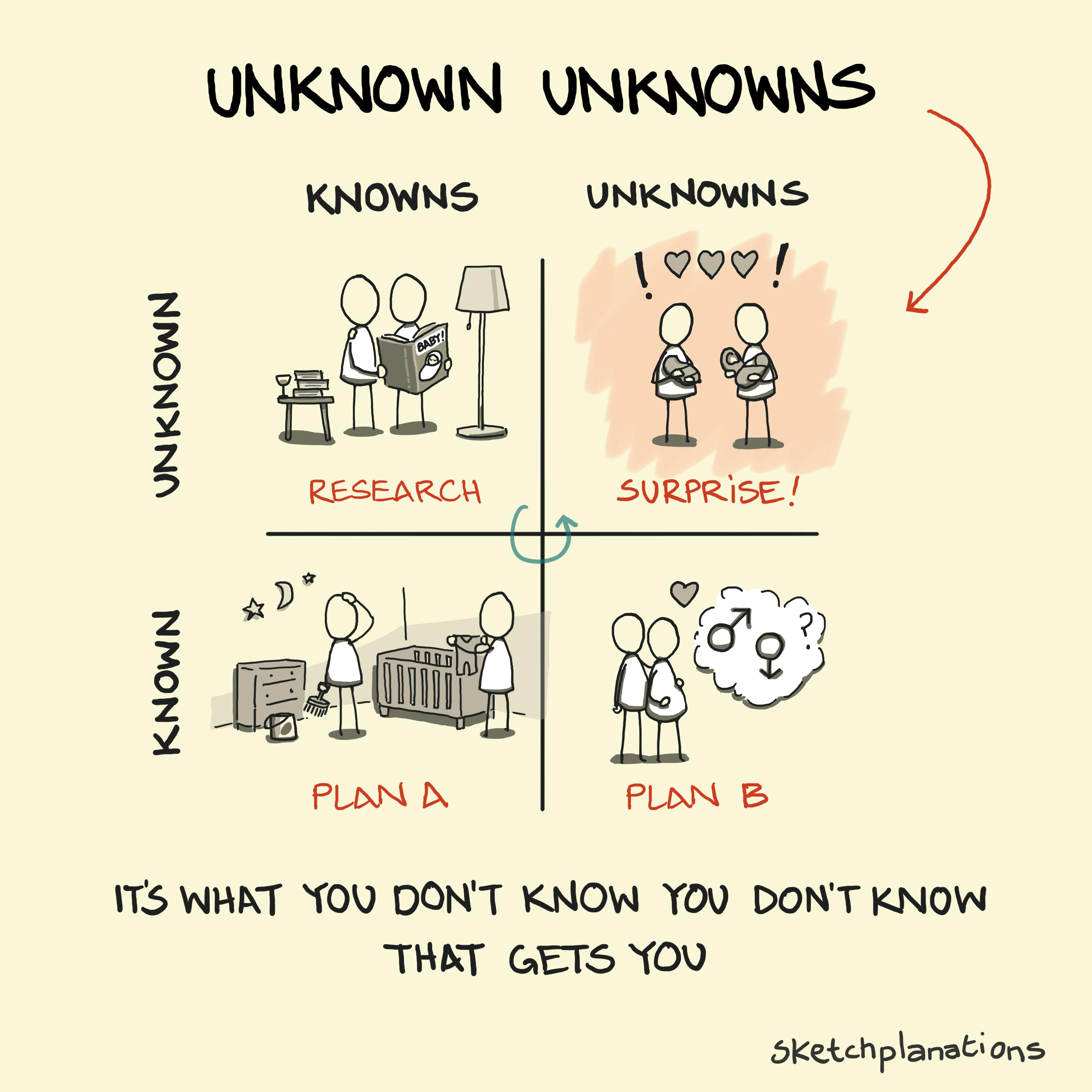Unknown Unknowns

👇 Get new sketches each week
In a 2002 Pentagon briefing, then U.S. Secretary of Defense Donald Rumsfeld famously said:
"Reports that say something hasn't happened are interesting to me, because as we know, there are known knowns; there are things we know we know.
We also know there are known unknowns; that is to say, we know there are some things we do not know.
But there are also unknown unknowns — the ones we don't know we don't know.
And if one looks throughout the history of our country and other free countries, it is the latter category that tends to be the difficult ones."
It wasn't typical media material. It even won Rumsfeld the "Foot in Mouth" award from the Plain English Campaign in 2003. But the idea of unknown unknowns has endured.
Awareness—Understanding examples
When placed in a 2x2, somewhat like I have done, some people have referred to it as the Rumsfeld Matrix (although he didn't invent it), or the Awareness—Understanding Matrix. I prefer diving straight into Unknown Unknowns as they're the crux of it.
For example:
Say you find out you're going to have a baby. There's a lot you know and a lot you know you don't:
Unknown Knowns — things you know that people know about being a parent and having a baby, but you just don't know them yet. Doing your research and homework transforms these into Known Knowns.
Known Knowns are the things you already know (or just learned) you'll need to do when you're a parent. Your baby will need feeding and changing, clothes, a place to sleep etc. You plan for these, you buy clothes, a crib, and learn about breastfeeding or the bottle.
Known Unknowns — Things like the baby's gender, or whether they'll arrive early or late. You know you don't know these yet, but you can make a plan either way.
Finally, there are Unknown Unknowns — which, in this case, could be that, despite all your plans, you find yourself with twins.
Or, say you plan to start a café:
Unknown Knowns
What you know is knowable, but you don't know it, yet
You can find data on the market, the costs, and potential customers. These things can be known through research—others know them—but you didn't know them.
Known Knowns
What you know you know
Your costs, your product, your route to market, everything you learned in your research. You make your plan around these.
Known Unknowns
What you know you don't know
How people will respond to your product, how fast sales will be, and whether your rent will change.
Unknown Unknowns
What you didn't know you didn't know
Just as you launch your café, Starbucks moves in next door, or we hit a global pandemic.
It's what you don't know, that you don't know, that gets you. After all, if you knew it, you'd have prepared for it.
He Who Knows
There's a well-known saying called "He who knows" which relates to Unknown Unknowns:
He who knows not, and knows not he knows not, is a fool; shun him.
He who knows not, and knows he knows not, is simple; teach him.
He who knows, and knows not he knows, is asleep; awaken him.
He who knows, and knows he knows, is wise; follow him.
Note that, like most interpretations of the Awareness/Knowledge-understanding framework, Unknown Knowns is interpreted as things you know but don't know you know. These might be implicit knowledge that you are yet to make a connection with.
Quotes and Ideas Relating to Unknown Unknowns
We have a host of sayings and thoughts that relate to this.
- Nassim Nicholas Taleb's Black Swan events: if every swan you've ever seen is white, it's easy to assume that all swans are white, but the next one you see could be black.
- The Lucretius problem, also from Taleb: We tend to believe the biggest event we've seen is the biggest that could happen. For example, we test our financial models against the most significant market crashes, but each was bigger than any that had hit before.
- In theory, practice is the same as theory, but not in practice.
- No plan survives contact with the enemy — from Prussian Field Marshal Helmuth von Moltke the Elder
- It has often and confidently been asserted, that man's origin can never be known : but ignorance more frequently begets confidence than does knowledge : it is those who know little, and not those who know much, who so positively assert that this or that problem will never be solved by science. — Charles Darwin, The Descent of Man (1871) introduction
Whatever our plans, or what we think we know, or even what we think we know we don't know, we must adapt to succeed.
Related Ideas to Unknown Unknowns
Unknown unknowns evidently weigh heavily on me, as I seem to have drawn many more related ideas:
- Black Swan events
- The Lucretius Problem
- The Johari Window — for self-knowledge
- The Conscious Competence framework
- In theory, practice is the same as theory, but not in practice
- VUCA - Volatility, Uncertainty, Complexity, Ambiguity
- OODA Loop - Observe, Orient, Decide, Act, Repeat
- On mistakes
- Hindsight bias — everything is obvious after the fact
- Physics Envy
- Hofstadter's Law
- The Cobra Effect
- The Law of Unintended Consequences
- Do a 2x2 Matrix
- Kitchen Table Survival Skills

